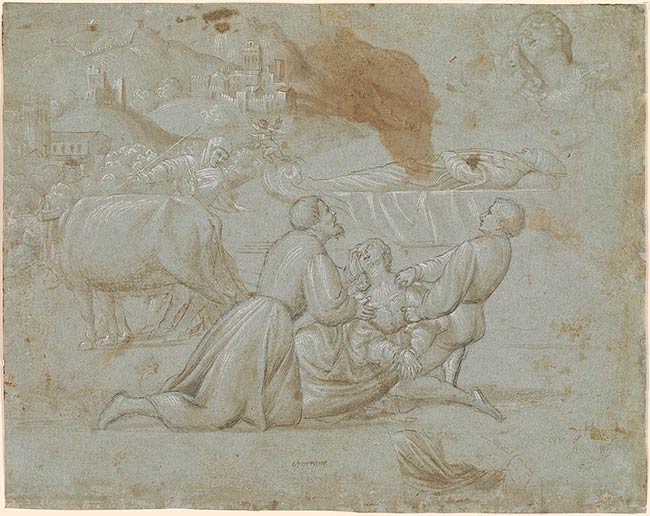

Formerly catalogued as by Pordenone, the double-sided sheet was identified in 1972 by Charles Cohen as by Pordenone’s pupil and son-in-law, Pomponio Amalteo. Recto and verso are finished studies, corresponding almost exactly to two of five panels which originally made up the parapet of the organ in the cathedral at Cenada (present-day Vittorio Veneto) and now in the Museo Diocesano (Cohen 1975, figs. 8 and 10). A document of 1534 recording a payment to the artist “per le pitture dell’organo” (Pordenone 1980, 148) makes this the artist’s earliest connected drawing. The artist received the commission from Cardinal Marino Grimani, the patriarch of Aquileia and administrator of the diocese of Ceneda.
The scenes represent episodes from the story of the miraculous transport in the seventh century of the body of Saint Titian from Oderzo, where he had been bishop, to Ceneda. The recto represents the liberation of a possessed woman as she passes near the body of the saint, while the verso shows the body of Saint Titian miraculously traveling upstream on the River Livensa in a small boat pulled by angels. In the background, in another miraculous episode, the cart carrying the body of the saint is immobilized by angels despite the efforts of four straining oxen. Three detail studies on the recto take up the figure of the possessed woman: at upper right, her head and shoulders, at lower right, drapery and her crossed hands, and at lower left her nose and eye.
Watermark: none.
Formerly attributed to Giovanni Antonio Pordenone, Pordenone 1483?-1539 Ferrara.
Inscribed by the artist at lower center in pen and brown ink: "o fortuna;" on verso at lower left in pen and brown ink: "Pordenone"; on fragment of old mount (in departmental files), in pen and brown ink: "Gioan Antonio da Pordenone".
Pordenone, Giovanni Antonio, 1484?-1539, Formerly attributed to.
Calzolari, Francesco, 1522-1609, former owner.
Moscardo, Lodovico, 1611-1681, former owner.
Scholz, János, former owner.
Cohen 1975, 19-27; Cohen 1980, 33-34, 39, fig. 141; Pordenone 1980, 45, 80, 87, 102-03, fig. 10 (recto); Truant 1981, 81, fig. 3-4; Turin 1990, 138; Florence 2001, 452, no. 105.
Ryskamp, Charles, ed. Twentieth Report to the Fellows of the Pierpont Morgan Library, 1981-1983. New York : Pierpont Morgan Library, 1984, p. 232.
